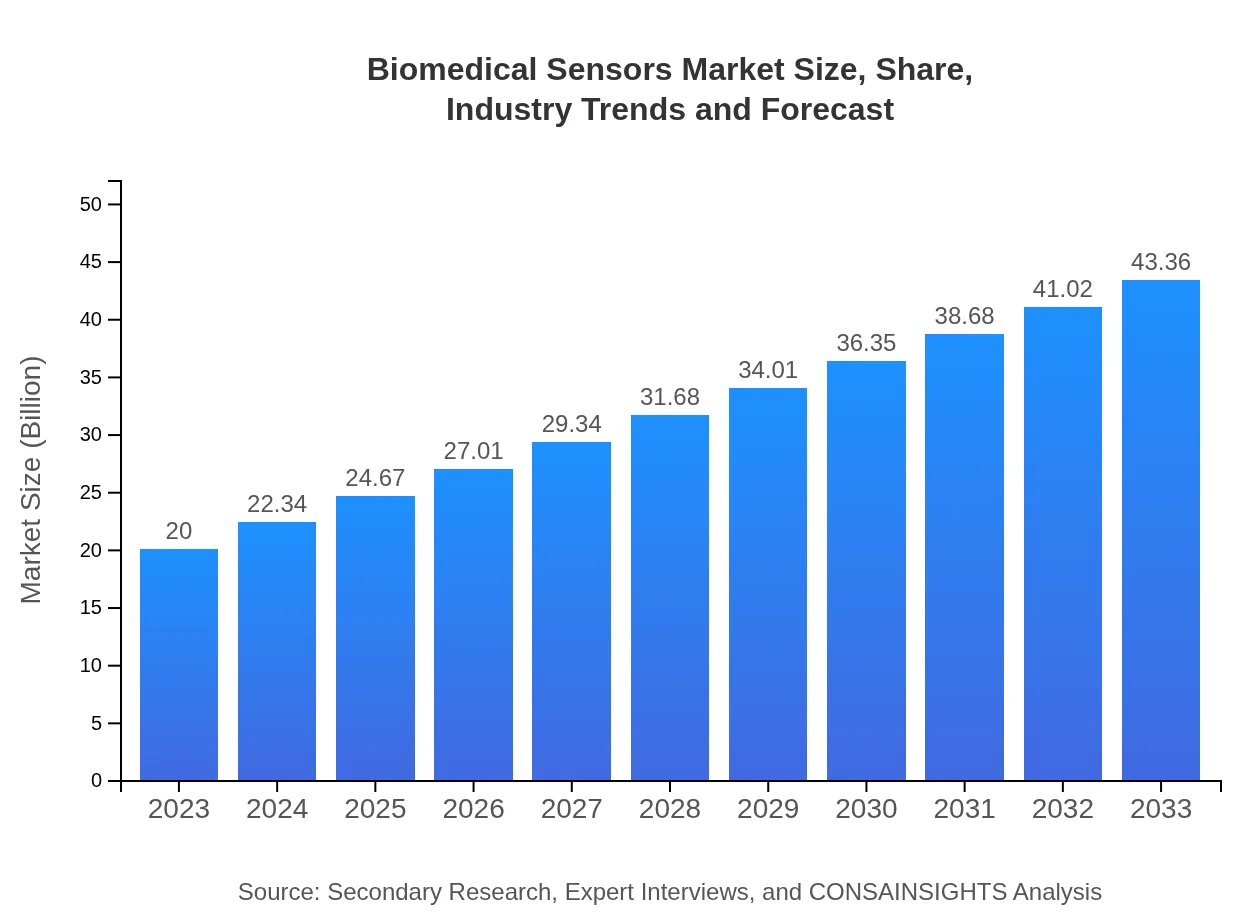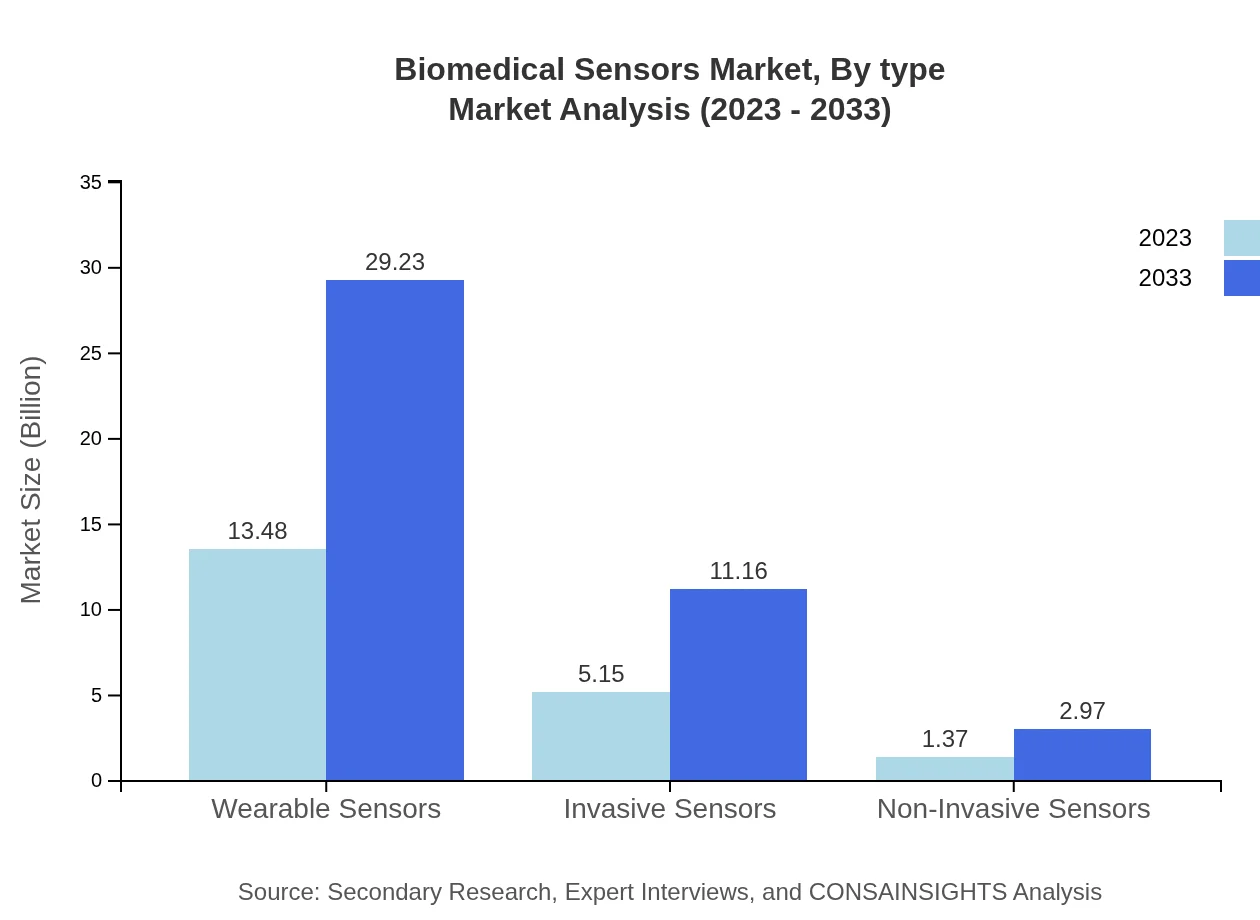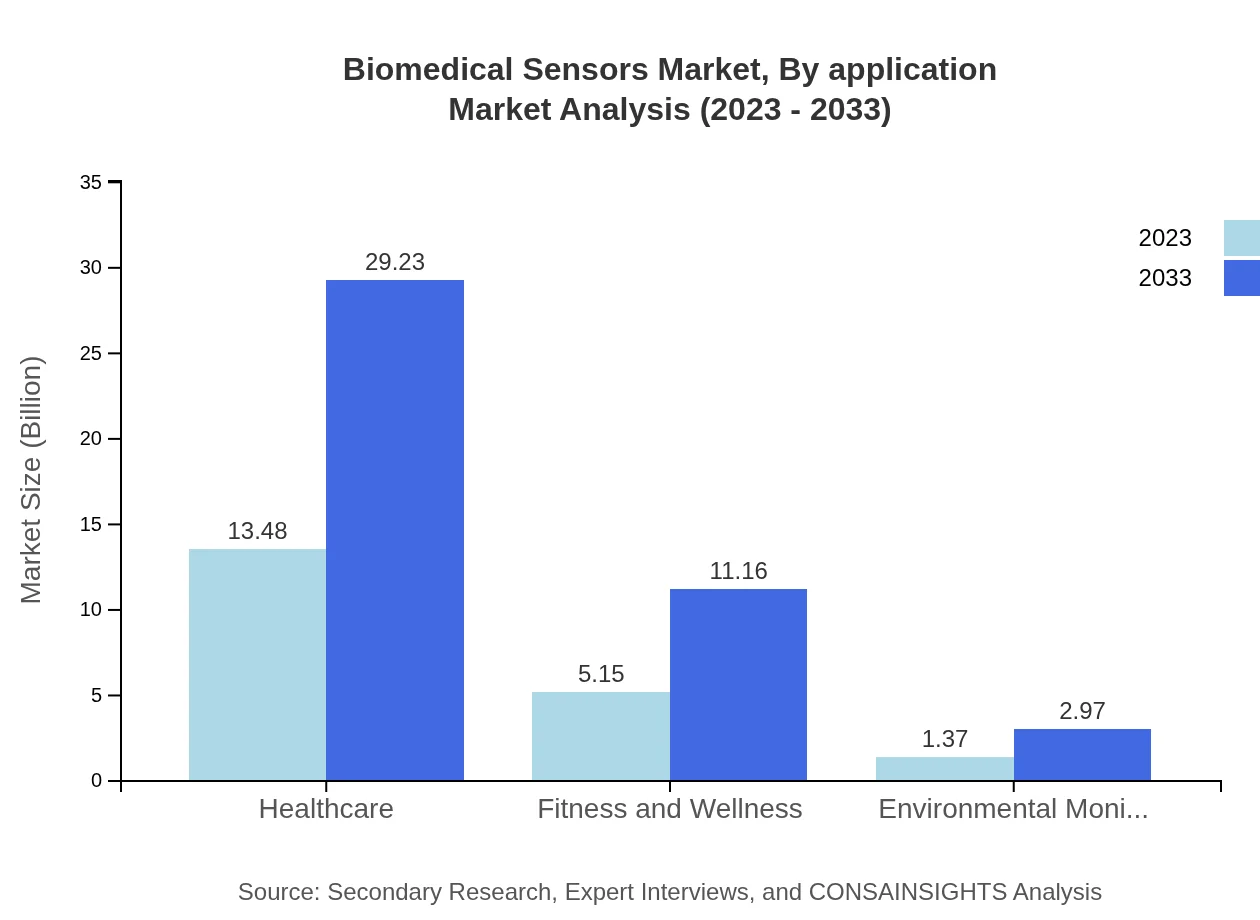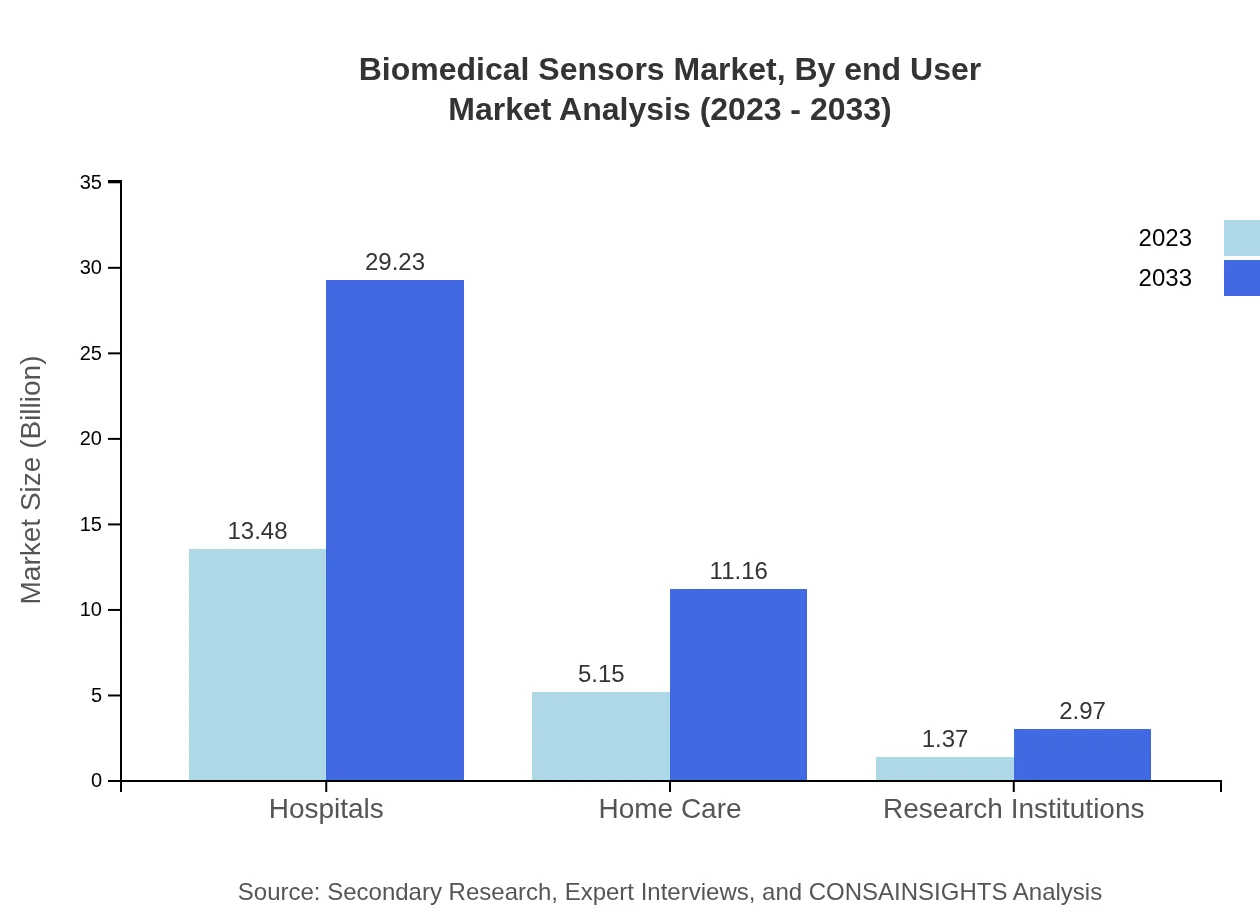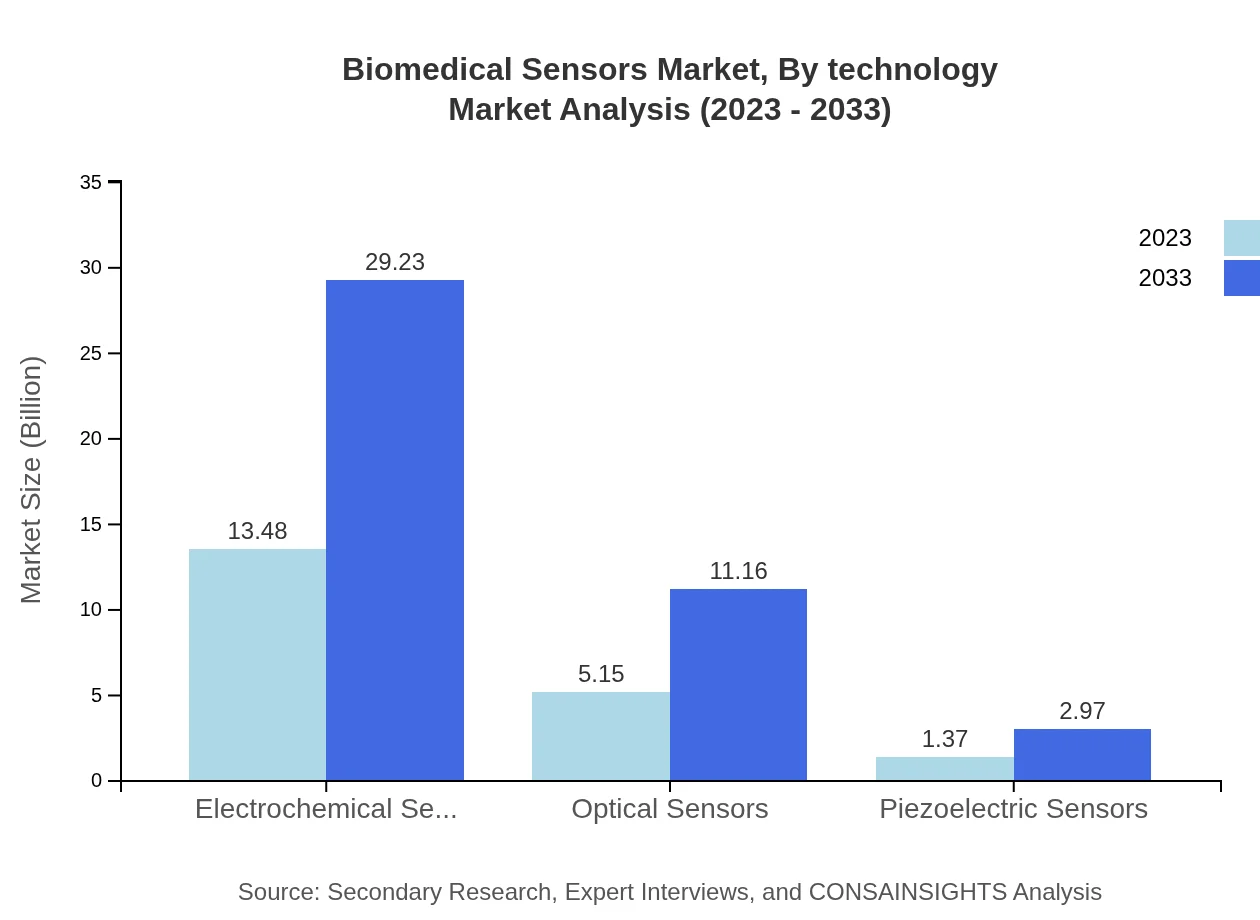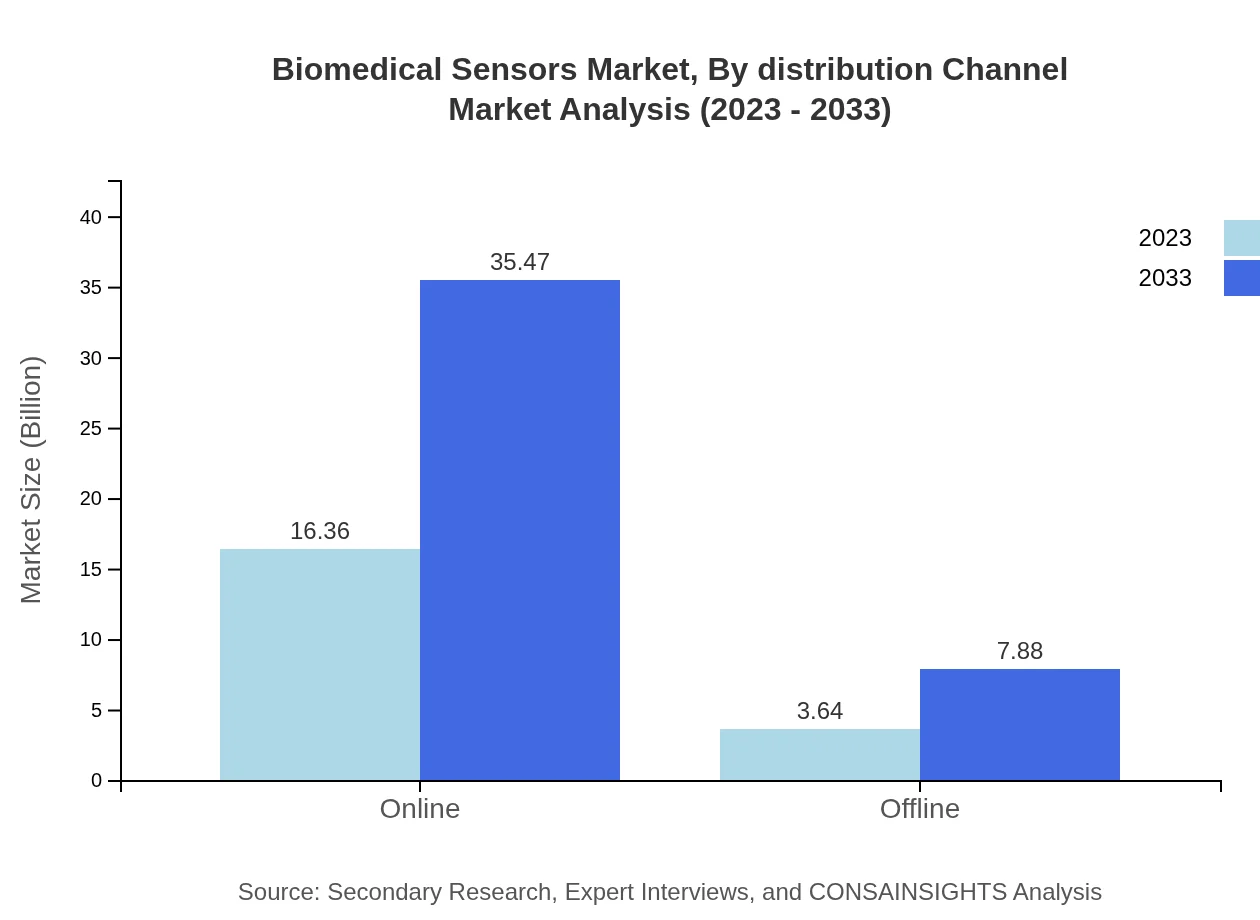Biomedical Sensors Market Report
Published Date: 31 January 2026 | Report Code: biomedical-sensors
Biomedical Sensors Market Size, Share, Industry Trends and Forecast to 2033
This report presents a thorough analysis of the Biomedical Sensors market, providing insights into market trends, segmentation, and regional analysis from 2023 to 2033, including forecasts and growth projections that will impact the industry.
| Metric | Value |
|---|---|
| Study Period | 2023 - 2033 |
| 2023 Market Size | $20.00 Billion |
| CAGR (2023-2033) | 7.8% |
| 2033 Market Size | $43.36 Billion |
| Top Companies | Medtronic , Abbott Laboratories, Philips, Siemens Healthineers, Honeywell |
| Last Modified Date | 31 January 2026 |
Biomedical Sensors Market Overview
Customize Biomedical Sensors Market Report market research report
- ✔ Get in-depth analysis of Biomedical Sensors market size, growth, and forecasts.
- ✔ Understand Biomedical Sensors's regional dynamics and industry-specific trends.
- ✔ Identify potential applications, end-user demand, and growth segments in Biomedical Sensors
What is the Market Size & CAGR of Biomedical Sensors market in 2023?
Biomedical Sensors Industry Analysis
Biomedical Sensors Market Segmentation and Scope
Tell us your focus area and get a customized research report.
Biomedical Sensors Market Analysis Report by Region
Europe Biomedical Sensors Market Report:
The European Biomedical Sensors market is estimated at USD 5.01 billion in 2023, projected to grow to USD 10.85 billion by 2033 due to stringent healthcare regulations and a strong emphasis on preventive healthcare.Asia Pacific Biomedical Sensors Market Report:
The Asia Pacific region's Biomedical Sensors market is expected to grow from USD 4.28 billion in 2023 to USD 9.28 billion in 2033, showcasing a robust CAGR. The region benefits from increasing investment in healthcare infrastructure and a growing elderly population, resulting in higher demand for continuous monitoring and wearables.North America Biomedical Sensors Market Report:
North America is the largest market, with a size of USD 6.62 billion in 2023, expected to reach USD 14.36 billion by 2033. The region leads in technological advancements, and the high adoption rate of telemedicine and personalized healthcare solutions supports market growth.South America Biomedical Sensors Market Report:
In South America, the market size is projected to grow from USD 1.74 billion in 2023 to USD 3.76 billion by 2033, driven by the rising prevalence of chronic diseases and expanding healthcare access initiatives throughout countries like Brazil and Argentina.Middle East & Africa Biomedical Sensors Market Report:
The Middle East and Africa's market size will grow from USD 2.36 billion in 2023 to USD 5.11 billion by 2033, indicating a growing healthcare sector that is increasingly relying on advanced sensor technologies for patient management.Tell us your focus area and get a customized research report.
Biomedical Sensors Market Analysis By Type
The Biomedical Sensors market, segmented by type, shows robust growth in wearable sensors, which dominate the market with a size projected to grow from USD 13.48 billion in 2023 to USD 29.23 billion by 2033, maintaining a significant market share of 67.41%. Invasive sensors will also see substantial growth, increasing from USD 5.15 billion to USD 11.16 billion, while non-invasive sensors are expected to grow from USD 1.37 billion to USD 2.97 billion.
Biomedical Sensors Market Analysis By Application
Application-wise, the healthcare segment is forecasted to grow substantially, from USD 13.48 billion in 2023 to USD 29.23 billion by 2033. Home care and fitness/wellness segments are critical too, with projections of growth from USD 5.15 billion to USD 11.16 billion, underscoring the shift towards home-based health solutions.
Biomedical Sensors Market Analysis By End User
By end-user, hospitals account for the largest share, with market sizes expanding from USD 13.48 billion in 2023 to USD 29.23 billion by 2033. Home care services are projected to show tremendous growth, increasing from USD 5.15 billion to USD 11.16 billion, reflecting the rising trend of patient self-monitoring.
Biomedical Sensors Market Analysis By Technology
The Biomedical Sensors market by technology illustrates that electrochemical sensors lead the segment with a valuation of USD 13.48 billion in 2023, expected to grow to USD 29.23 billion in 2033. Optical and piezoelectric sensors also show promise with respective market sizes of USD 5.15 billion and USD 1.37 billion in 2023.
Biomedical Sensors Market Analysis By Distribution Channel
Distribution channels for Biomedical Sensors reflect a strong online presence, with expectations to leap from USD 16.36 billion in 2023 to USD 35.47 billion in 2033. Offline channels will also grow significantly from USD 3.64 billion to USD 7.88 billion, indicating a balanced approach to market outreach.
Biomedical Sensors Market Trends and Future Forecast
Tell us your focus area and get a customized research report.
Global Market Leaders and Top Companies in the Biomedical Sensors Industry
Medtronic :
Medtronic is a global leader in medical technology and develops advanced sensor technologies for continuous glucose monitoring systems.Abbott Laboratories:
Abbott Laboratories focuses on innovative diagnostic solutions and is known for its high-quality biosensors for various health monitoring applications.Philips:
Philips is committed to improving people’s health through innovative technologies, including advanced biomedical sensors for patient monitoring.Siemens Healthineers:
Siemens Healthineers provides comprehensive healthcare solutions with a strong emphasis on biomedical sensors for diagnostics.Honeywell :
Honeywell’s focus on integrated healthcare solutions includes the development of biomedical sensors designed for environmental monitoring and healthcare applications.We're grateful to work with incredible clients.









FAQs
What is the market size of biomedical Sensors?
The global biomedical sensors market is currently valued at approximately $20 billion, with a projected CAGR of 7.8% over the next decade. By 2033, this market is expected to significantly expand, reflecting technological advancements and increasing healthcare needs.
What are the key market players or companies in the biomedical Sensors industry?
Key players in the biomedical sensors market include companies like Medtronic, Abbott Laboratories, Siemens Healthineers, Philips, and Honeywell. These organizations are at the forefront of innovation, developing state-of-the-art sensors for medical applications.
What are the primary factors driving the growth in the biomedical sensors industry?
Growth in the biomedical sensors industry is driven by advancements in technology, a rising demand for remote patient monitoring, increasing prevalence of chronic diseases, and the integration of sensors in wearable health devices, enhancing patient care and diagnostics.
Which region is the fastest Growing in the biomedical sensors?
North America is the fastest-growing region in the biomedical sensors market, with a projected increase from $6.62 billion in 2023 to $14.36 billion by 2033. This growth is fueled by a strong healthcare infrastructure and increasing investment in medical technology.
Does ConsaInsights provide customized market report data for the biomedical sensors industry?
Yes, ConsaInsights offers customized market report data tailored to specific needs within the biomedical sensors industry. Clients can request detailed insights, specific regional analysis, and tailored forecasts to suit their strategic requirements.
What deliverables can I expect from this biomedical sensors market research project?
From this market research project, clients can expect comprehensive reports including market size estimates, growth forecasts, competitive analysis, segmentation data, and key trends for a thorough understanding of the biomedical sensors landscape.
What are the market trends of biomedical sensors?
Current trends in the biomedical sensors market include the rise of wearable devices, increasing adoption of non-invasive sensors, and a shift towards telehealth solutions. There is a notable emphasis on enhancing patient experience through smart, connected devices.

